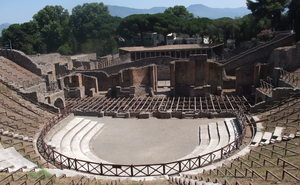 The Septuagint (from the Latin septuaginta, "seventy") is a Koine Greek translation of a Hebraic textual tradition that included certain texts which were later included in the canonical Hebrew Bible and other related texts which were not. As the primary Greek translation of the Old Testament, it is also called the Greek Old Testament. This translation is quoted a number of times in the New Testament,[1][2] particularly in Pauline epistles,[3] and also by the Apostolic Fathers and later Greek Church Fathers.
The Septuagint (from the Latin septuaginta, "seventy") is a Koine Greek translation of a Hebraic textual tradition that included certain texts which were later included in the canonical Hebrew Bible and other related texts which were not. As the primary Greek translation of the Old Testament, it is also called the Greek Old Testament. This translation is quoted a number of times in the New Testament,[1][2] particularly in Pauline epistles,[3] and also by the Apostolic Fathers and later Greek Church Fathers.
The title (Greek: Ἡ μετάφρασις τῶν Ἑβδομήκοντα, lit. "The Translation of the Seventy") and its Roman numeral LXX refer to the legendary seventy Jewish scholars who solely translated the Five Books of Moses into Koine Greek as early as the 3rd century BCE.[4][5] Separated from the Hebrew canon of the Jewish Bible in Rabbinic Judaism, translations of the Torah into Koine Greek by early Jewish Rabbis have survived as rare fragments only.
The traditional story is that Ptolemy II sponsored the translation of the Torah (Pentateuch, Five Books of Moses). Subsequently, the Greek translation was in circulation among the Alexandrian Jews who were fluent in Koine Greek but not in Hebrew,[6] the former being the lingua franca of Alexandria, Egypt and the Eastern Mediterranean at the time.[7]
The Septuagint should not be confused with the seven or more other Greek versions of the Old Testament,[4] most of which did not survive except as fragments (some parts of these being known from Origen's Hexapla, a comparison of six translations in adjacent columns, now almost wholly lost). Of these, the most important are those by Aquila, Symmachus, and Theodotion.






